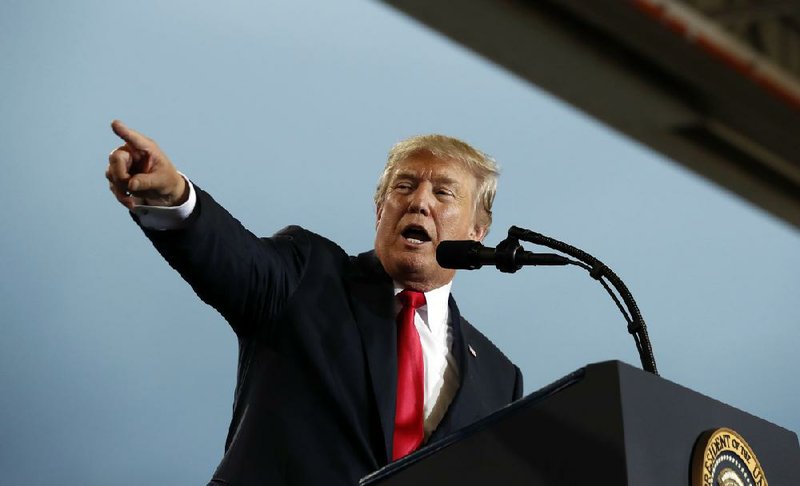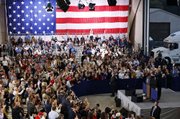MIDDLETOWN, Pa. -- President Donald Trump pitched his tax plan as a boost for truckers at an event Wednesday in Pennsylvania, saying, "America first means putting American truckers first."
Trump appeared before about 1,000 cheering people in an airplane hangar draped with American flags. Two big rigs sat in the background.
"It will be rocket fuel for our economy," Trump said of a plan that would slash corporate tax rates from 35 percent to 20 percent, reduce the number of personal income tax brackets and boost the standard deduction.
Trump said a cut to business taxes would help truckers because there will be "more products to deliver and more contracts to fill." He also said his plan would benefit middle-class families by lowering rates, creating new jobs and making it easier for business owners to pass companies on to their children.
[PRESIDENT TRUMP: Timeline, appointments, executive orders + guide to actions in first 200 days]
"So many people have come up to me and said, 'Give it to the middle class, give it to people who need it,'" Trump said.
Trump is diving back into the tax fight after weeks in which his attention has shifted to rapidly emerging crises -- including the mass shooting in Las Vegas and the hurricane recovery effort in Puerto Rico -- as well as his feud with Sen. Bob Corker, R-Tenn., and reports of tension with Secretary of State Rex Tillerson.
Taxes are the chief legislative priority for Republicans hungry for a key legislative achievement. With the 2018 campaign year looming, GOP lawmakers want something to show for their time as the majority party, and tax legislation is seen as their best hope.
Trump has left it up to Congress to fill in many specifics of his plan, which omits details such as the income levels for his new tax brackets. The outreach to truckers in Pennsylvania is an attempt to give a blue-collar appeal to a framework that outside tax analysts have said would largely favor the wealthy.
About two-thirds of trucking firms are structured as small businesses in which the profits double as the owners' income, what's commonly known as "pass-through" companies, said Chris Spear, president of the American Trucking Associations.
The framework would cut the tax rate for these firms to 25 percent from 39.6 percent.
"It's pretty critical for our membership," Spear said.
But the liberal Center on Budget and Policy Priorities said few truckers would benefit from this preferential rate because the majority of truck drivers are employees rather than pass-through business owners, based on its analysis of Census data.
During his speech, Trump hailed truckers as a barometer for the nation's economy and praised them as unsung heroes.
"You're going to make more money. You're going to do better than ever before. And we truly admire you. You are our heroes, believe me," he told them. "You are our heroes."
Republicans in Congress aren't solidly behind Trump, with some from high-tax states balking because the framework calls for eliminating the federal deduction for state and local taxes. That deduction is claimed by an estimated 44 million people and costs the government an estimated $1.3 trillion in lost revenue over 10 years.
Some Republican lawmakers, especially those from New York, New Jersey and California, are wary of the potential financial hit to their constituents. They contend that repealing the deduction would subject people to being taxed twice.
Rep. Chris Collins, R-N.Y., a member of the group and a Trump ally, warned Wednesday that states such as his would need some "accommodations" to go along with eliminating the deduction for state and local taxes paid, possibly a cap on how much could be deducted.
Completely scrapping the deduction "would impact too many middle-income people," Collins said.
Discussions with House leaders on a possible compromise took place last week but are on hold, Collins and other lawmakers in the group said Wednesday. They said they were confident of reaching a compromise.
Trump highlighted the tax plan's provisions aimed at encouraging international companies to bring back to the U.S., or repatriate, cash that they've kept overseas. All told, there's more than $1 trillion in cash held abroad by S&P 500 companies, according to Deutsche Bank.
"We will totally eliminate the penalty on returning future earnings back to the United States and we will impose a one-time low tax on money currently parked overseas so it can be brought back home to America, where it belongs and where it can do its job," Trump said. He added that his Council of Economic Advisers estimates that the change, along with a lower tax rate, "would likely give the typical American household a $4,000 pay raise."
"Could be a lot more than that, too," he said.
The $4,000 in additional income estimate comes from a back-of-the-envelope calculation by White House economics adviser Kevin Hassett based on companies returning 71 percent of their foreign profits over the course of eight years.
The estimate appears to assume that the returned profits would flow to workers in the form of higher wages. But many economists say much of it would likely be returned to investors in the form of stock dividends and buybacks.
Trump's administration has tended to emphasize the benefits that corporate tax cuts mean to individuals more than other economists do. For example, Treasury Secretary Steven Mnuchin has said that workers bear 70 percent or more of the corporate tax burden -- which is expressed through lower wages.
The Congressional Budget Office uses a figure that's closer to 25 percent.
On Wednesday, Trump also said he would help truckers with a yet-to-be-announced infrastructure plan that would have "a special focus on roadways and highways."
"They will be smooth, beautiful highways again," he said.
POSSIBLE HURDLES
Trump's tax cut plan will confront a legislative hurdle next week as Senate Republicans face a cliffhanger vote on their budget resolution.
Republicans control 52 votes in the 100-seat Senate, and they can afford to lose only two GOP lawmakers to pass the budget resolution -- which would give the party the room it needs in the budget to pass a tax overhaul on a party-line vote.
Many Senate GOP aides said they believe Sen. Rand Paul, R-Ky., will oppose the budget resolution because it will not commit to eliminating the deficit over 10 years, and the votes of other Senate Republicans remain unclear.
"It's not something they are taking for granted," said Douglas Holtz-Eakin, a conservative economist who is president of the American Action Forum, referring to Senate Republican leaders. "They are worried."
Just weeks ago, Senate Republicans were touting progress on the budget deal as a sign of their party's ability to unify, after party deficit hawks found a compromise with those pushing for the large, supply-side tax cuts to move the bill through committee. But now the budget's prospects in the broader Senate have again become clouded.
Sen. Thad Cochran, R-Miss., is still recovering from health problems and has not voted in the Senate since mid-September. He is expected back next week, but his timetable could not be confirmed.
Sen. John McCain, R-Ariz., has voiced support for the GOP tax cut effort, but he has also not committed to backing the budget resolution. In the past, McCain has sought assurances that the government's budget would include more money for the military, something the current Senate budget does not do.
And Sen. Susan Collins, R-Maine, has shown a willingness to buck her party this year, opposing a repeal of the Patient Protection and Affordable Care Act. She voted in favor of GOP-driven tax cuts in 2003, but she is also expected to announce Friday whether she will run for governor next year, a decision that could change her approach to legislating.
Spokesmen for McCain, Collins and Paul declined to say whether the lawmakers would vote for the measure next week.
A spokesman for Cochran didn't respond to a request for comment.
The House and the Senate must pass matching budget resolutions to proceed on a tax bill that can pass with only 50 votes in the Senate, assuming they also will have the support of Vice President Mike Pence, who can cast a tiebreaker vote.
If they don't pass matching budget resolutions, then Senate bills need 60 votes to clear procedural hurdles, something that could prove very difficult to achieve if Democrats unify in opposition to the plan.
A number of Democrats have criticized the tax cut framework advanced by the White House and Republican leaders, alleging that it would amount to a huge tax cut for the wealthy, something that Paul has said he worries could be true.
One pivotal vote that Republican leaders appeared to have secured last week was that of Corker, who supported the budget resolution during a Senate Budget Committee vote despite misgivings about its potential effect on the debt.
The budget resolution would essentially allow the tax cut plan to add $1.5 trillion to the debt over 10 years, and Corker has said he wants assurances that it would actually reduce the deficit, not increase it.
Republican leaders were working to make Corker feel more comfortable with the approach, but Corker and Trump got into a war of words in recent days. Asked Tuesday whether his spat with Corker could damage the chances of passing the tax cut plan, Trump said, "I don't think so, no. I don't think so at all. I think we're well on our way."
Information for this article was contributed by Catherine Lucey, Josh Boak, Ken Thomas, Frank Eltman, Marcy Gordon, Kevin Freking and Jill Colvin of The Associated Press; by Damian Paletta, Mike DeBonis, Paul Kane and Kelsey Snell of The Washington Post; and by Jennifer Epstein and Justin Sink of Bloomberg News.
A Section on 10/12/2017

